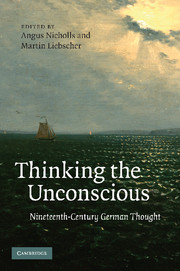Book contents
- Frontmatter
- Contents
- Notes on contributors
- Introduction: thinking the unconscious
- 1 The unconscious from the Storm and Stress to Weimar classicism: the dialectic of time and pleasure
- 2 The philosophical significance of Schelling's conception of the unconscious
- 3 The scientific unconscious: Goethe's post-Kantian epistemology
- 4 The hidden agent of the self: towards an aesthetic theory of the non-conscious in German romanticism
- 5 The real essence of human beings: Schopenhauer and the unconscious will
- 6 Carl Gustav Carus and the science of the unconscious
- 7 Eduard von Hartmann's Philosophy of the Unconscious
- 8 Gustav Theodor Fechner and the unconscious
- 9 Friedrich Nietzsche's perspectives on the unconscious
- 10 Freud and nineteenth-century philosophical sources on the unconscious
- Epilogue: the “optional” unconscious
- Works cited
- Index
- References
9 - Friedrich Nietzsche's perspectives on the unconscious
Published online by Cambridge University Press: 04 August 2010
- Frontmatter
- Contents
- Notes on contributors
- Introduction: thinking the unconscious
- 1 The unconscious from the Storm and Stress to Weimar classicism: the dialectic of time and pleasure
- 2 The philosophical significance of Schelling's conception of the unconscious
- 3 The scientific unconscious: Goethe's post-Kantian epistemology
- 4 The hidden agent of the self: towards an aesthetic theory of the non-conscious in German romanticism
- 5 The real essence of human beings: Schopenhauer and the unconscious will
- 6 Carl Gustav Carus and the science of the unconscious
- 7 Eduard von Hartmann's Philosophy of the Unconscious
- 8 Gustav Theodor Fechner and the unconscious
- 9 Friedrich Nietzsche's perspectives on the unconscious
- 10 Freud and nineteenth-century philosophical sources on the unconscious
- Epilogue: the “optional” unconscious
- Works cited
- Index
- References
Summary
Shortly before his mental breakdown at the beginning of January 1889, Friedrich Nietzsche wrote in Ecce Homo (1888) that “out of my writings there speaks a psychologist who has not his equal, that is perhaps the first thing a good reader will notice.” Since then, posterity has subscribed to his verdict. Today his opus is regarded as an essential contribution to a psychology of the unconscious and he himself is supposed to have been a precursor to psychoanalysis. This is rather surprising, as Nietzsche's philosophy contains no explicit theory of the unconscious; in other words, the concept of the unconscious is not at the center of his thinking. Instead one can – especially in the early writings – detect an understanding of the unconscious which aligns Nietzsche with a tradition of thought from early Romanticism to Schopenhauer, a concept with which he assumed his learned audience would be familiar. But at the same time he began – in his unpublished observations, and under the influence of contemporary scientific and linguistic theories – to bestow his own meaning upon this conception of the unconscious. This stream of thought led, in connection with his theory of the drives, to a somatic understanding of the unconscious in his middle period. As I will argue, Nietzsche's middle-period writings already pointed towards the dissolution of the concept of the unconscious, a process that was finally completed in Nietzsche's late writings on the will to power.
- Type
- Chapter
- Information
- Thinking the UnconsciousNineteenth-Century German Thought, pp. 241 - 260Publisher: Cambridge University PressPrint publication year: 2010
References
- 5
- Cited by



